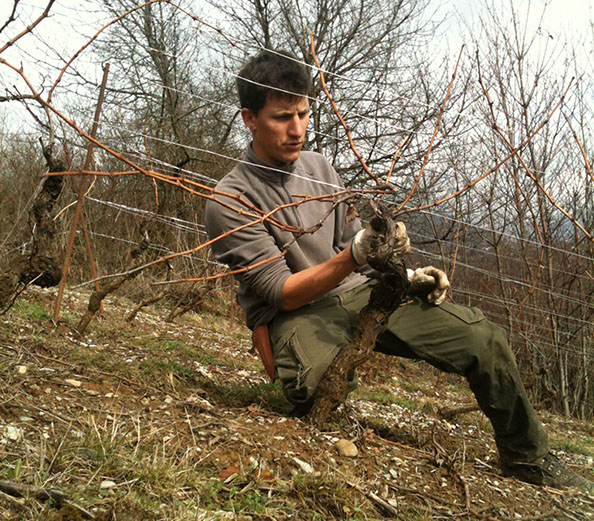Nicolas Ferrand, Domaine des Cotês Rousses, Savoie, Frankrike

Nicolas Ferrands barndomsdröm var att få bli mjölk och ostbonde i Alperna precis som sina farföräldrar. Efter att ha fullföljt sin masters i infrastruktur och fysisk planering ville Nicolas komma närmare sin barndomsdröm om att bli bonde så han valde att göra en åtta månaders praktik hos en producent i Savoie. Vinmakaren visade sig ha brutit med sin samarbetspartner och var inte speciellt intresserad av vinmakning. Detta ledde till att Nicolas själv fick vinifiera vinerna i konsultation med en lokal oenolog. Så föddes drömmen om att en dag kunna göra vin själv och Nicolas tyckte att detta jobb var perfekt för honom och hans ständiga nyfikenhet och passion för naturen.
En dag dök möjligheten upp då en vän ringde upp Nicolas och berättade att han hade köpt tio hektar vinmark och kunde inte ta hand om allt själv. Detta blev starten för Nicolas stora dröm och han köpte sin första vinmark i Saint-Jean-de-la-Porte sa upp sig från sitt dag jobb och började läsa till oenolog i Beaune och efter avslutade studier och arbete för sig själv släppte han till slut sin första årgång 2015.
Nicolas stora passion för naturen har gjort att valet att jobba organiskt föll sig enkelt och han hoppas på att få sin certifiering inom några år. Med Nicolas egna ord vid mitt senaste besök:
“Due to my passion for the nature and my respect of the earth (my environnement), it was obvious for me to choose an organic production. In this way my work is also more complex and rich! I think it’s the same for the quality of the wine, I taste a lot of wine and for me there is something more vibrant and deeper in the organic wines. Especially when it’s wine with natural yeast and a low level of sulphites in a natural way. I like free wine but rights without deviation and defects. In that philosophy I attempt to touch my wines less as possible without additives. It’s the quality of the raw material that is the guarantee of quality. So, I spend most part of my time in the vineyard. At the cellar I do the less as possible in order to preserve the fruits and to reveal the terroir aromas. As my boss told me it’s the same as a chef when he is cooking good food, he’s just checking the casserole simmering.
For the red wines I do a maceration in entire grape without remontage, pigeages… I press with a low intensity, racking after fermentation and before élevage…no filtration, and no sulfites except 1g at the bottling in function of the cuvée and the vintage. I use old barrels on Coteau de la Mort to reveal the power of the terroir and not in order to mask aromas with a wood taste.
Same thing on the white wines, all on total lees to the bottling. without sulphites during the vinification the wine is more free and makes the malolactic fermentation also.
Due to my career I have no heritage of family winemaker. Therefore, I am free in my choices and I wanted to brake the bourgeois codes of wine, that’s the reason I choose a non traditional kind of label. For me the most important is the taste and not the knowledge. Everybody can taste and have an opinion on wine. The most important is to feel something and to have an emotion when you drink it. The same you can feel with the food of a great chef. Most of the time it’s the simple recipes which makes the greatest emotions (with a respect of the raw product). It’s the most important for me to respect the earth and the product, to feel emotions to the customers (as a chef). When he’s drinking wine, the customer should emotionally be travelling in a terroir (in the french alps in my case). And I think it’s not easy to do! To really understand a terroir it’s a life experience, changing its principles each year. We have to be humble face of the nature.”.
